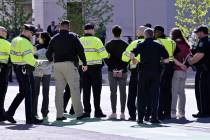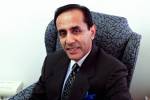Endoscopy clinic probes progressing
Every day, Las Vegas police Capt. Al Salinas expects his phone to ring with news of another infectious disease case linked to the Endoscopy Center of Southern Nevada.
"It's not a question of if that call is coming; it's a matter of when that call is coming," he said.
A team of detectives in Salinas' Organized Crime Bureau have been interviewing witnesses and poring over patient files for more than two months, building criminal cases against those they believe are responsible for infecting clinic patients with blood-borne diseases.
Health officials have linked seven cases of hepatitis C to unsafe injection practices at the Las Vegas clinic and continue investigating hundreds of other clinic patients who have tested positive for hepatitis, HIV and other diseases.
Last month, the Southern Nevada Health District announced that 77 patients with hepatitis C might have contracted their disease at the clinic.
Salinas knows each new confirmed case will fall to his already busy detectives, who are immersed in an investigation expected to last many more months.
"I'd be very surprised if we don't go into next year," he said. "It's going to be a long investigation."
The investigation has been slowed by a lack of cooperation by clinic workers who refuse to talk to police, he said.
Chief Deputy District Attorney Scott Mitchell, who will prosecute the case, said some clinic employees have come forward and given statements, but investigators have found nurse anesthetists and doctors the "most reluctant to cooperate."
Public health investigators have blamed the infections on unsafe injection practices by the nurse anesthetists, including reusing syringes and single-use vials of anesthesia.
Some clinic workers have told investigators they were ordered by clinic management to reuse supplies to save money.
"We could stand to have a few people do the right thing and not worry so much about self-preservation," Mitchell said, adding that witnesses who cooperate now are more likely to receive favorable treatment.
"The longer you wait, the less we'll need you and the less willing we'll be to offer some sort of deal to you," he said.
The investigation has given authorities a clearer picture of who was involved, Mitchell said.
"Some people are becoming less obvious targets, and some people are becoming more obvious targets," he said.
New targets could come up when detectives interview two doctors for the federal Centers for Disease Control and Prevention who observed unsafe practices during clinic inspections in January, Mitchell said. The CDC last week agreed to allow police to interview the doctors about what they saw and name who did what, he said.
If the investigation continues at its current pace, the first criminal charges could be filed in three to four months, Mitchell said.
Charges, which could include medical neglect, would center on the confirmed infection cases to keep the case from growing too unwieldy, he said.
"Maybe it's going to take the first few prosecutions before the rest realize this is serious," Salinas said.
Meanwhile, the FBI and Nevada attorney general's office were continuing their investigations into potential Medicare, Medicaid and medical insurance fraud, and administrative investigations by the state medical and nursing boards also were ongoing.
The Nevada State Board of Medical Examiners' investigations unit continues to gather evidence to determine if disciplinary action should be taken against doctors who worked at the endoscopy center and its affiliates between March 2004 and Jan. 11, the time frame health district officials place on the unsafe medical practices.
Executive Director Tony Clark said the board's three investigators and chief of investigations attend weekly meetings with authorities and share information.
The medical board is "particularly interested" in the group of 77 patients who might have contracted hepatitis C at the clinic, Clark said.
"We want to see where those cases lead us, what doctors performed procedures on them. That's what we're pursuing right now.''
The medical board has filed malpractice complaints against two doctors who performed medical procedures on the six patients who contracted hepatitis C on either July 25 or Sept. 21.
Dr. Dipak Desai's hearing is scheduled for September. Dr. Eladio Carrera's hearing is set for October.
Clark couldn't say when the investigation would be completed. Evidence is being given to one of the board's investigative committees, which will determine if formal complaints should be brought against other doctors.
"You've got to have evidence before you proceed,'' he said. "We're gathering more every day.''
Debra Scott, executive director of the Nevada State Board of Nursing, said six nurse anesthetists who worked at the endoscopy center and its affiliates have voluntarily surrendered their licenses pending a hearing.
They are all under investigation by the board, as are roughly 20 nurses who worked at the Endoscopy Center of Southern Nevada between March 2004 and Jan. 11.
No decision has been made on whether to file formal charges against the nurses, Scott said.
The nursing board was reviewing information in a CDC report, and the nurses' personnel records have been seized by Las Vegas police, she said.
Salinas said the criminal investigation is a police department priority, but it won't be rushed.
"People want closure. They want resolution, but we have to cross our T's and dot our I's."
Contact reporter Brian Haynes at bhaynes@reviewjournal.com or 702-383-0281.
HEPATITIS C INVESTIGATIONS AT A GLANCELAS VEGAS POLICEDetectives are interviewing witnesses and reviewing patient records of the seven confirmed hepatitis c cases linked to the endoscopy center of southern nevada. They also expect to talk to two doctors from the u.S. Centers for disease control and prevention who observed unsafe medical practices during clinic inspections in january. Charges could be filed in three to four months. NEVADA ATTORNEY GENERAL'S OFFICE/FBIInvestigators are reviewing billing records for evidence of medicaid and insurance fraud. STATE BOARD OF MEDICAL EXAMINERSBoard investigators are gathering evidence for possible disciplinary action against clinic doctors. The board already has filed malpractice complaints against drs. Dipak desai and eladio carrera, who performed procedures on patients who contracted hepatitis c. Hearings on the complaints have been set for this fall. Their licenses have been suspended, and they have agreed to temporary restraining orders that bar them from practicing medicine. STATE BOARD OF NURSINGSix nurse anesthetists who surrendered their licenses are under investigation, as are 20 other clinic nurses. No formal charges have been filed.























